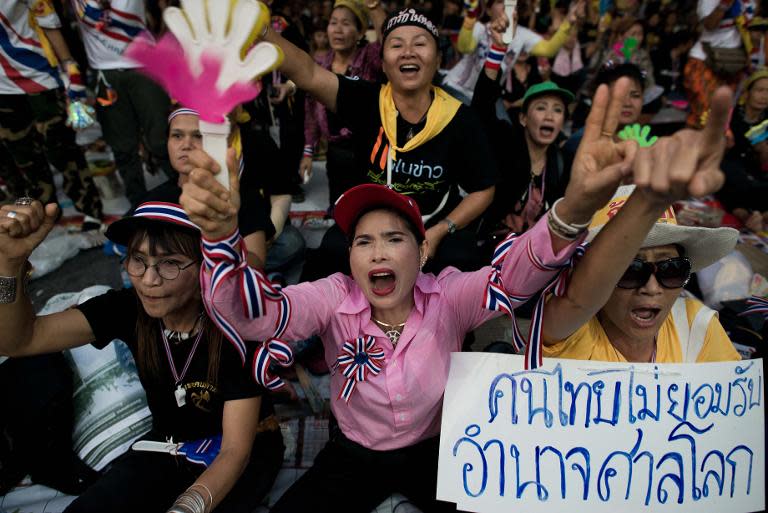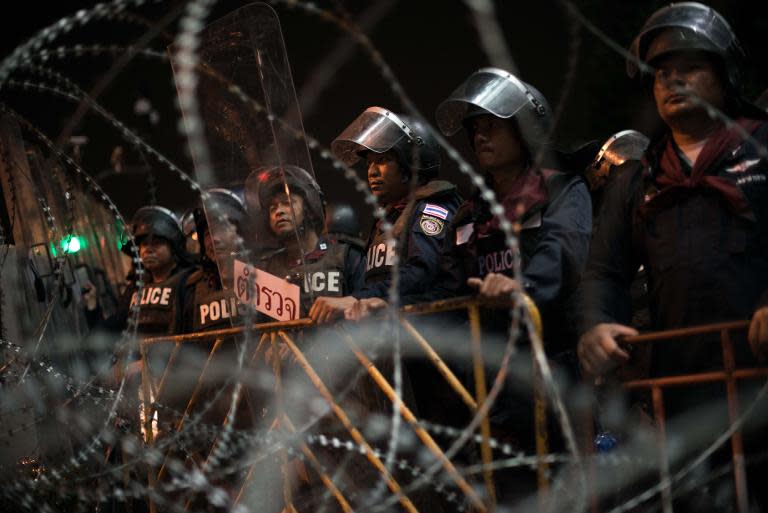Thai senate rejects disputed amnesty bill
Thailand's senate unanimously rejected a contentious political amnesty bill on Monday night, as tens of thousands of anti-government protesters massed in Bangkok to try to heap pressure on Prime Minister Yingluck Shinawatra. All 141 senators present voted to kick out the legislation, which the embattled premier has already pledged not to revive. The vote is likely to embolden a range of anti-government forces who have gathered in large numbers on Bangkok's streets for nearly a fortnight. "This house rejects this bill for consideration," deputy speaker Surachai Lengboonlertchai said of the legislation, which critics say was aimed at helping divisive former premier Thaksin Shinawatra -- Yingluck's brother -- return to Thailand from self-exile. Thaksin is a hugely polarising figure in Thailand, drawing great support from the rural poor but hatred from many of the Bangkok middle and upper classes. An estimated 50,000 protesters remained in the city's political centre on Monday night, according to police, heightening fears of clashes with authorities as street politics appeared to return to the capital. The opposition Democrat Party has harnessed the growing anti-government sentiment, while experts say the bill has chastened the ruling Puea Thai party and weakened Yingluck's authority. A spokesman for her party said the ruling coalition "would not bring this (bill) back to parliament", adding the opposition protests were now groundless. "We believe from tomorrow the political crisis will start to ease as there are no reasons to maintain the protest," said Pormpong Nopparit. But anti-government forces -- with the Democrats at the helm -- earlier vowed to keep up their mass rally. In a tub-thumping speech to rapturous supporters, a key Democrat leader vowed to turn the heat on Yingluck's government and urged supporters to observe a three-day strike starting on Wednesday. "I ask you to clear all your work tomorrow and then on 13, 14 and 15th (of November) we will stage a nationwide strike," former deputy prime minister Suthep Thaugsuban said to cheers of approval a few hours before the senate vote. Thaksin was toppled by royalist generals in 2006. He lives in exile to avoid prison for a corruption conviction that he contends was politically motivated. He would be excused of charges under the proposed blanket amnesty. Suthep, who is facing murder charges related to a bloody crackdown on protests in 2010 when the Democrats were in power, would also be cleared under the proposal, alongside his party leader Abhisit Vejjajiva. Demonstrators, many waving Thai flags, blowing whistles and using plastic hand-clappers, were in a bullish mood before the vote. "I came here to expel the Shin(awatra) family. I want them out," said one protester called Thamathorn, giving only one name. "Don't stay here and cheat this country. Get out!" Rallies have so far been peaceful, but concerns were mounting that the issue could unleash a fresh bout of political turmoil in a country rocked by a series of rival demonstrations since 2006. Thousands of police were deployed to protect Government House -- where Yingluck's offices are -- and parliament in case protests turn ugly, a police spokesman told AFP. Police have tear gas, batons, rubber bullets and water cannon at their disposal, according to Police General Adul Saengsingkaew, but will only use "necessary force" to ensure a peaceful protest. The senate debate coincided with a ruling by the International Court of Justice in The Hague which found that most of an area around an ancient temple on the Thai border belongs to Cambodia. Any public anger in Thailand over the ICJ's decision is likely to be directed against the government by the country’s opposition -- which includes some hardline nationalists among its supporters.



